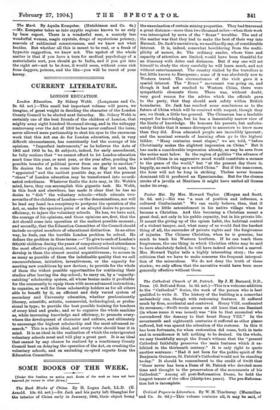C URRENT LITERATURE.
LONDON EDUCATION.
London Education. By Sidney Webb. (Long,mans and Co. 2s. 6d. net.)—This small but important volume will prove, we imagine, of great weight in deciding the character of the London County Council to be elected next Saturday. Mr. Sidney Webb is certainly one of the best friends of the children of London, that mighty army eight hundred thousand strong, and in the unhappy controversy over the Act of 1903 he has never confused the issue, never allowed mere partisanship to shut his eyes to the enormous work that this Act can do for London education, and, in very difficult circumstances, has consistently had the courage of his opinions. "Imperfect instruments," as he believes the Acts of 1902 and 1903 to be, fit subjects, indeed, for early amendment, he fully realises that "we cannot afford to let London education mark time this year, or next year, or the year after, pending the possible transfer of political power from one party to another." He desires the Act to come into force on May 1st next, the "appointed" and the earliest possible day, so that the present "chaos" of London education may be transformed into co-ordi- nated orderliness. Whatever faults the Acts may, in Mr. Webb's mind, have, they can accomplish this gigantic task. Mr. Webb, in this book and elsewhere, has made it clear that he has no desire to " dish " the voluntary schools—which educate two- sevenths of the children of London—or the denominations, nor will he lend any hand in a conspiracy to postpone the operation of the Act, or, under the specious guise of an alleged desire to promote efficiency, to injure the voluntary schools. He has, we have said, the courage of his opinions, and those opinions are, first, that the Act should come into operation at the earliest possible moment ; and secondly, that the Education Committee of the Council should include co-opted members of educational distinction. In no other way, he feels, can the terrible London problem be solved. He defines the problem in these terms :—" To give to each of London's 800,000 children during the years of compulsory school attendance the most effective physical, moral, and intellectual training ; to develop in them the utmost mental acquisitiveness ; to arouse in as many as possible of them the indefinable quality that we call resourcefulness, initiative, inventiveness, or the capacity for meeting new conditions by new devices ; to provide for the whole of them the widest possible opportunities for continuing their studies after leaving the day-school; to carry on, by a 'capacity- catching' scholarship system, all whose brains make it profitable for the community to equip them with more advanced instruction; to organise, as well for these scholarship holders as for all others able to benefit by it, an efficient and duly varied system of secondary and University education, whether predominantly literary, scientific, artistic, commercial, technological, or profes- sional in type ; to provide the best possible training for teachers of every kind and grade ; and so to organise the whole machine as, while increasing knowledge and efficiency, to promote every- where the development of character and culture, and ultimately to encourage the highest scholarship and the most advanced re- search." This is a noble ideal, and every voter should bear it in mind. It is an ideal in the realisation of which the reinvigorated voluntary schools must and will play a great part. It is an ideal that cannot by any chance be realised by a reactionary County Council bent on delaying the operation of the Act, on crushing the voluntary schools, and on excluding co-opted experts from the Education Committee.










































 Previous page
Previous page